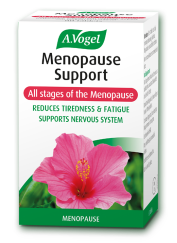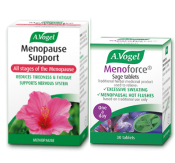Read the full video transcript below
Today's topic
Today I’m going to talk about why it’s a good idea to go and see your doctor.
Now, I know a lot of you out there will be going, “But you’re trying to promote natural remedies. Why would we want to go to the doctor?” Well, here in the UK alone, at this present moment, there’s at least 1.9 to 2 million women going through the menopause.
Research has actually shown that a lot of women don’t go to the doctor and they may be suffering unnecessarily. So, I always say, if you’re in any doubt at all, go and see the doctor, get your symptoms checked out, because it may not be what it seems.
The effects of falling oestrogen
Now, falling oestrogen will cause a huge raft of direct symptoms caused by the menopause, but there’s lots of other things that can happen at this time as well, that can cause very similar symptoms but will not be helped by hormonal medication.
For instance, falling oestrogen can actually cause low thyroid function. Low thyroid function will cause fatigue, joint aches, sleep, weight gain, poor hair.
Low iron and low vitamin D
If you have been getting really heavy periods or flooding or prolonged periods on the approach to the menopause, you could actually be really low in iron. Low iron will actually trigger more heavy periods. You can feel breathless and you can actually get dizzy and you can get fatigue.
We know today, especially in the UK again, that low Vitamin D is actually becoming an epidemic. Low Vitamin D will cause fatigue, joint and muscle aches and pains, and low mood. We’ve also got low Vitamin B12 as well, and that can cause very similar symptoms.
Know what's causing your symptoms
You can see already that there’s a number of things that are not necessarily associated directly with the menopause that are going to give you exactly the same symptoms. If you try supplements or if you try things like HRT, because these symptoms are not associated with the hormones themselves, you may find that they don’t actually work particularly well. So, getting a diagnosis is the first step to getting yourself actually sorted. Once you know what’s going wrong, then you can actually make it a lot easier to treat yourself.
Don't ignore breast changes
Now, there are other symptoms that you may get during the menopause that you really must go and see the doctor about. This would be any breast changes at all. If you start to get any pain, any discomfort, especially if you’re getting any discharge from your nipples as well, really don’t hesitate. Please go and see the doctor.
Prolonged periods
The other thing is prolonged periods. You will not believe the number of women who contact us who have been bleeding nonstop for days and sometimes weeks, and then they’re actually asking us, “Is this okay? Is this normal?”
It does happen. It can be a really common scenario as you start the approach to the menopause. But, it is not good for you. This is going to cause the low iron. It’s going to cause the fatigue. Let’s face it, if you were bleeding from anywhere else on your body for that length of time, you would be taking yourself down to A&E.
So it’s really important, if your periods are longer than a week, if they’re not stopping, if they’re getting a lot closer together, or you’re seriously flooding, then please go and speak to your doctor.
Bloating
The other one which may not seem quite so common is bloating. Now, if you’re getting daily bloating… You know, very often we get up in the morning, we’ve got nice, flat stomachs. Then, you find that you get a bit bloated by the evening time, this is very often just digestive bloating. That’s really not too bad. But, if you feel that you’re bloated the whole time, if your stomach feels very hard, if you’re getting a lot of pain and discomfort, then please, please, please go and see the doctor.
Don't be embarrassed about talking to your doctor
Now, this is a big issue, because we know a lot of women don’t want to bother their doctor. They are embarrassed about talking to the doctor about their menopausal symptoms. We find, too, that there’s the whole white coat syndrome. There you are going to the doctor’s. I’m going to tell him about my menopause symptoms. The minute you get in there, because you’re actually talking about things, very often women will start to cry. The doctor then thinks that you’re depressed and will just offer you antidepressants.
Be prepared for your GP appointment with our doctor's checklist
So, we wanted to try and give you something that you can take to the doctor. You can think about it before you go. You can think about your symptoms, about what’s going on, about how you feel, so that when you actually go to the doctor, you’re a lot more prepared. What we’ve got is a little form here. You might not be able to see it. There will be a link here and you can actually download it and print it. It’s just a little tick box. You can tick all the things that you’re feeling, all the things that you’re worried about. Also, there’s a space here as well if there’s anything else that you want to talk about as well.
Take a friend
If you feel that going to the doctor is going to be a little bit of an issue, if you have been before and you’ve basically been knocked back… We have women tell us that they’ve been to the doctor and told not to be silly and just to get on with it. Take a friend with you, because it’s sometimes really handy having someone else beside you to accompany you. Very often, the doctor will possibly take you more seriously anyway.
Until next week...
So, please let me know how you get on. Let me know if you find that this has helped you, or even if you’ve had any problems going to the doctor. I will look forward to seeing you next week on A.Vogel Talks Menopause.










